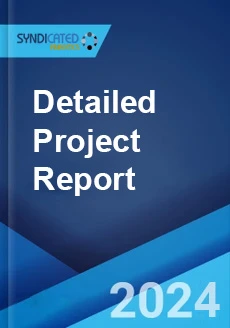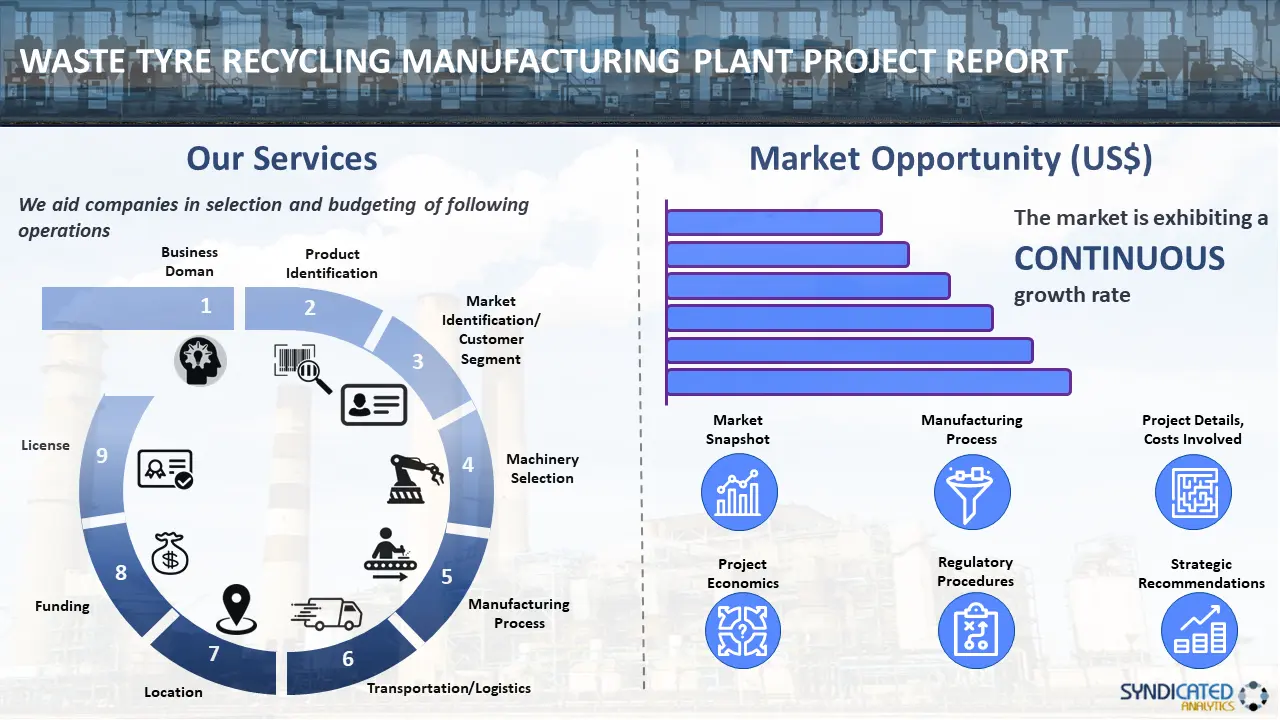
Waste Tyre Recycling Manufacturing Plant Project Report 2025 Edition
Report Coverage: Industry Analysis (Market Performance, Segments, Price Analysis, Outlook), Detailed Process Flow (Product Overview, Unit Operations, Raw Materials, Quality Assurance), Requirements and Cost (Machinery, Raw Materials, Packaging, Transportation, Utility, Human Resource), Project Economics (Capital Investments, Operating Costs, Profit Projections, Financial Analysis, Revenue), and Investment Opportunities
Report Overview:
Syndicated Analytics report, titled “Waste Tyre Recycling Manufacturing Plant Project Report 2025 Edition: Industry Analysis (Market Perfrmance, Segments, Price Analysis, Outlook), Detailed Process Flow (Product Overview, Unit Opoerations, Raw Materials, Quality Assurance), Requirements and Cost (Machinery, Raw Materials, Packaging, Transportation, Utility, Human Resource), Project Economics (Capital Investments, Operating Costs, Profit Projections, Financial Analysis, Revenue), and Investment Opportunities ,” provides a complete roadmap for setting up a waste tyre recycling manufacturing plant. It covers a comprehensive market overview to micro-level information such as unit operations involved, raw material requirements, utility requirements, infrastructure requirements, machinery and technology requirements, manpower requirements, packaging requirements, transportation requirements, etc. The report provides detailed insights into project economics, including capital investments, project funding, operating expenses, income and expenditure projections, fixed costs vs. variable costs, direct and indirect costs, expected ROI and net present value (NPV), profit and loss account, financial analysis, etc. This report is a must-read for entrepreneurs, investors, researchers, consultants, and business strategists with a stake in the waste tyre recycling industry. It provides an in-depth analysis of the industry's current state and future potential, offering valuable insights for decision-making and strategy development. The report is an indispensable resource that offers a detailed examination of the waste tyre recycling industry. It is a valuable tool for anyone seeking to establish a foothold in this dynamic sector.

Waste tyre recycling, also known as waste rubber recycling, is the process of disposing and recycling discarded tyres that are no longer used in vehicles due to wear and tear. The used tyres are the most problematic sources of waste due to the large volume produced and their inherent durability. As a result, they are recycled into functional products using pyrolysis, ambient mechanical grinding and cryogenic grinding technologies.
Market Trends/Drivers:
One of the primary factors driving the market is the rapid growth of the automotive industry and the rising sales of vehicles. Waste tyre recycling aids in conserving landfill space and preventing the spread of diseases as discarded old tyres provide a nesting place for rodents and mosquitoes. Apart from this, accidental fires caused by tyre dumps can rage for months releasing toxic fumes. Due to this, there has been escalating demand for waste tyre recycling. Moreover, with the rising environmental concerns, individuals are reusing tyres as tyre climbers, thus enhancing ecological balance, saving extensive amounts of energy, and minimizing greenhouse gas emissions. Besides this, the growing need to protect the environment from excessive plastic and rubber wastage has prompted leading tyre recyclers to spend huge amounts on advancing technologies and equipment, which can help in recycling the tyres for various applications and protect the environment. In line with this, certain tax variations in new tyres and disposal of old tyres are acting as another major growth-inducing factor. Moreover, stringent regulations formulated by governments of various nations in order to protect the environment from solid waste are creating a positive market outlook. For instance, the federal government of the United States is generating funds for the recycling and managing scrap tyres by processing the fees on new tyres and disposal facilities of old tyres.
The report provides a techno-commercial roadmap for setting up an waste tyre recycling manufacturing plant. The study covers all the requisite aspects that one needs to know while making a foray into the waste tyre recycling industry. This ranges from macro overview of the market to micro details of the industry performance, key success and risk factors, manufacturing requirements, project cost, project economics, expected returns on investment, profit margins, etc. This report is a must-read for entrepreneurs, investors, researchers, consultants, business strategists, and all those who have any kind of stake in the waste tyre recycling industry.
The project report covers the following aspects of the waste tyre recycling market:
- Market Snapshot:
- Market Performance
- Market Breakup by Segment
- Market Breakup by Region
- Price Trends
- Impact of COVID-19
- Market Outlook
- Manufacturing Process:
- Product Overview
- Detailed Process Flow
- Unit Operations Involved
- Mass Balance and Raw Material Requirements
- Project Details, Requirements and Costs Involved:
- Land, Location and Site Development
- Plant Layout
- Machinery Requirements and Expenditures
- Raw Material Requirements and Expenditures
- Packaging Requirements and Expenditures
- Transportation Requirements and Expenditures
- Utility Requirements and Expenditures
- Manpower Requirements and Expenditures
- Project Economics
- Capital Investments
- Operating Costs
- Expenditure Projections
- Revenue Projections
- Profit Projections
- Financial Analysis
- Regulatory Procedures and Approval
- Key Success and Risk Factors
Report Scope:
| Report Features | Details |
|---|---|
| Product Name | Waste Tyre Recycling |
| Report Coverage | Detailed Process Flow: Unit Operations Involved, Quality Assurance Criteria, Technical Tests, Mass Balance, and Raw Material Requirements Land, Location and Site Development: Selection Criteria and Significance, Location Analysis, Project Planning and Phasing of Development, Environmental Impact, Land Requirement and Costs Plant Layout: Importance and Essentials, Layout, Factors Influencing Layout Plant Machinery: Machinery Requirements, Machinery Costs, Machinery Suppliers (Provided on Request) Raw Materials: Raw Material Requirements, Raw Material Details and Procurement, Raw Material Costs, Raw Material Suppliers (Provided on Request) Packaging: Packaging Requirements, Packaging Material Details and Procurement, Packaging Costs, Packaging Material Suppliers (Provided on Request) Other Requirements and Costs: Transportation Requirements and Costs, Utility Requirements and Costs, Energy Requirements and Costs, Water Requirements and Costs, Human Resource Requirements and Costs Project Economics: Capital Costs, Techno-Economic Parameters, Income Projections, Expenditure Projections, Product Pricing and Margins, Taxation, Depreciation Financial Analysis: Liquidity Analysis, Profitability Analysis, Payback Period, Net Present Value, Internal Rate of Return, Profit and Loss Account, Uncertainty Analysis, Sensitivity Analysis, Economic Analysis Other Analysis Covered in The Report: Market Trends and Analysis, Market Segmentation, Market Breakup by Region, Price Trends, Competitive Landscape, Regulatory Landscape, Strategic Recommendations, Case Study of a Successful Venture |
| Currency | US$ (Information can also be provided in the local currency) |
| Pricing and Purchase Options | Single User License: US$ 3450 Five User License: US$ 4450 Corporate User License: US$ 5450 |
| Customization Scope | The report can also be customized based on the requirement of the customer |
| Post-Sale Analyst Support | 12-14 Weeks |
| Delivery Format | PDF and Excel through email (We can also provide the editable version of the report in PPT/Word format on special request) |
Key Questions Answered in This Report?
- What are the key success and risk factors in the waste tyre recycling industry?
- How has the waste tyre recycling market performed so far and how will it perform in the coming years?
- What is the structure of the waste tyre recycling industry and who are the key players?
- What are the various unit operations involved in an waste tyre recycling manufacturing plant?
- What is the total size of land required for setting up an waste tyre recycling manufacturing plant?
- What are the machinery requirements for setting up an waste tyre recycling manufacturing plant?
- What are the raw material requirements for setting up an waste tyre recycling manufacturing plant?
- What are the utility requirements for setting up an waste tyre recycling manufacturing plant?
- What are the manpower requirements for setting up an waste tyre recycling manufacturing plant?
- What are the infrastructure costs for setting up an waste tyre recycling manufacturing plant?
- What are the capital costs for setting up an waste tyre recycling manufacturing plant?
- What are the operating costs for setting up an waste tyre recycling manufacturing plant?
- What should be the pricing mechanism of an waste tyre recycling scooter?
- What will be the income and expenditures for an waste tyre recycling manufacturing plant?
- What is the time required to break-even?
Need a Customized Project Report?
Although we have tried to make the report as comprehensive as possible, we believe that every stakeholder may have their specific requirements. In view of this, we can customize the report based on your particular needs. You can share your business requirements with our consultants, and we will provide you a tailored scope. Some of the common customizations that our clients request us include:
- The report can be customized based on the country/region that you plan to set up your plant.
- The manufacturing capacity of the plant can be customized based on your requirements.
- Machinery suppliers and costs can be customized based on your requirements.
- Any additions to the current scope can also be provided based on your requirements.
Why buy Syndicated Analytics reports?
-
Our reports provide stakeholders insights into the viability of a business venture, allowing them to take informed business decisions.
- We have a strong network of consultants and domain experts in 100+ countries across North America, Europe, Asia Pacific, South America, Africa, and the Middle East.
- We have a strong database of equipment and raw material suppliers across all major continents.
- We regularly track and update land costs, construction costs, Utility costs, labour costs, etc across 100+ countries around the globe
- We are the trusted business partners to the world’s leading corporates, governments, and institutions. Our client list ranges from small and start-up businesses to fortune 500 companies
- Our strong in-house team of engineers, statisticians, modelling experts, charted accountants, architects, etc. have been instrumental in building, expanding, and optimizing sustainable manufacturing plants across the globe.
Purchase Options
Ask For Customization
Personalize this research
Triangulate with your own data
Get data as per your format and definition
Gain a deeper dive on a specific application, geography, customer or competitor
Any level of personalization
Get in Touch
Call us on
US: +1-213-316-7435
Uk: +44-20-8040-3201
Drop us an email at
sales@syndicatedanalytics.com